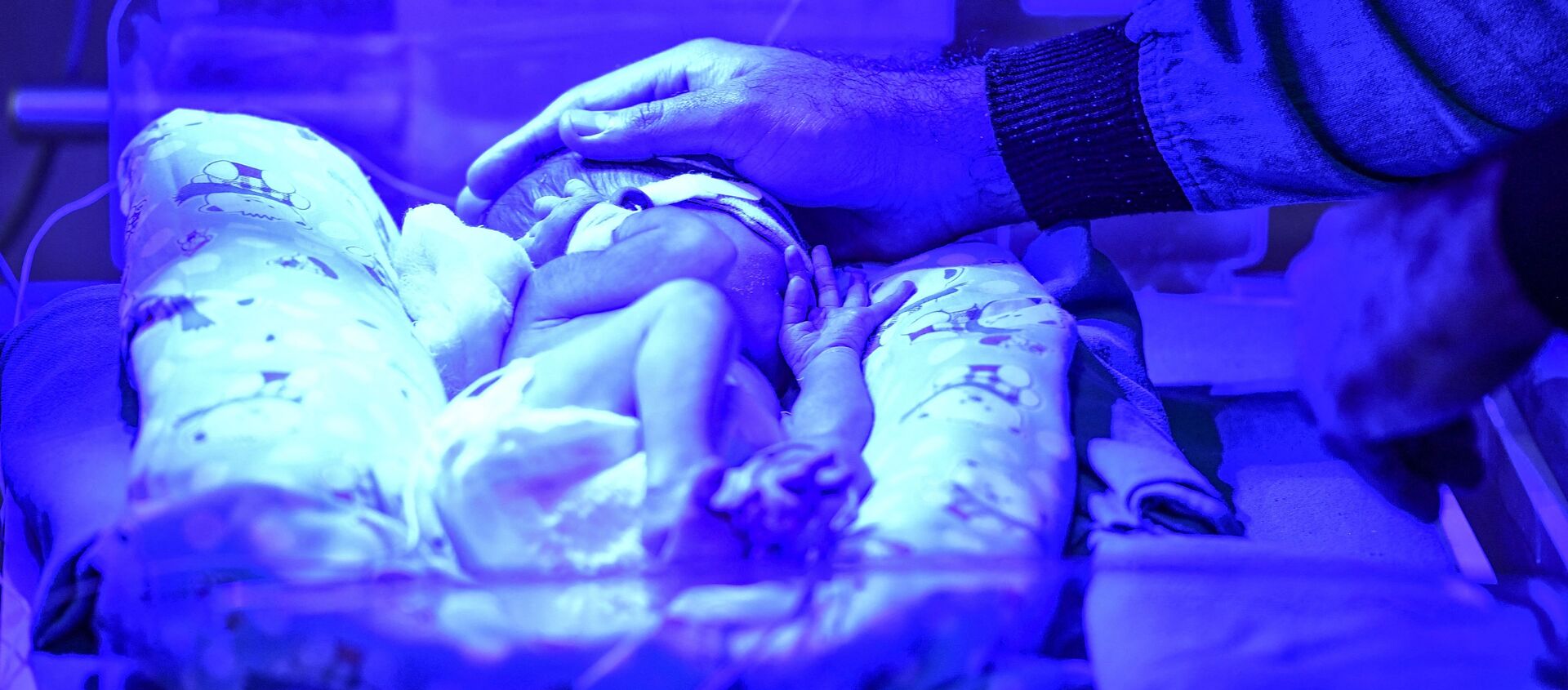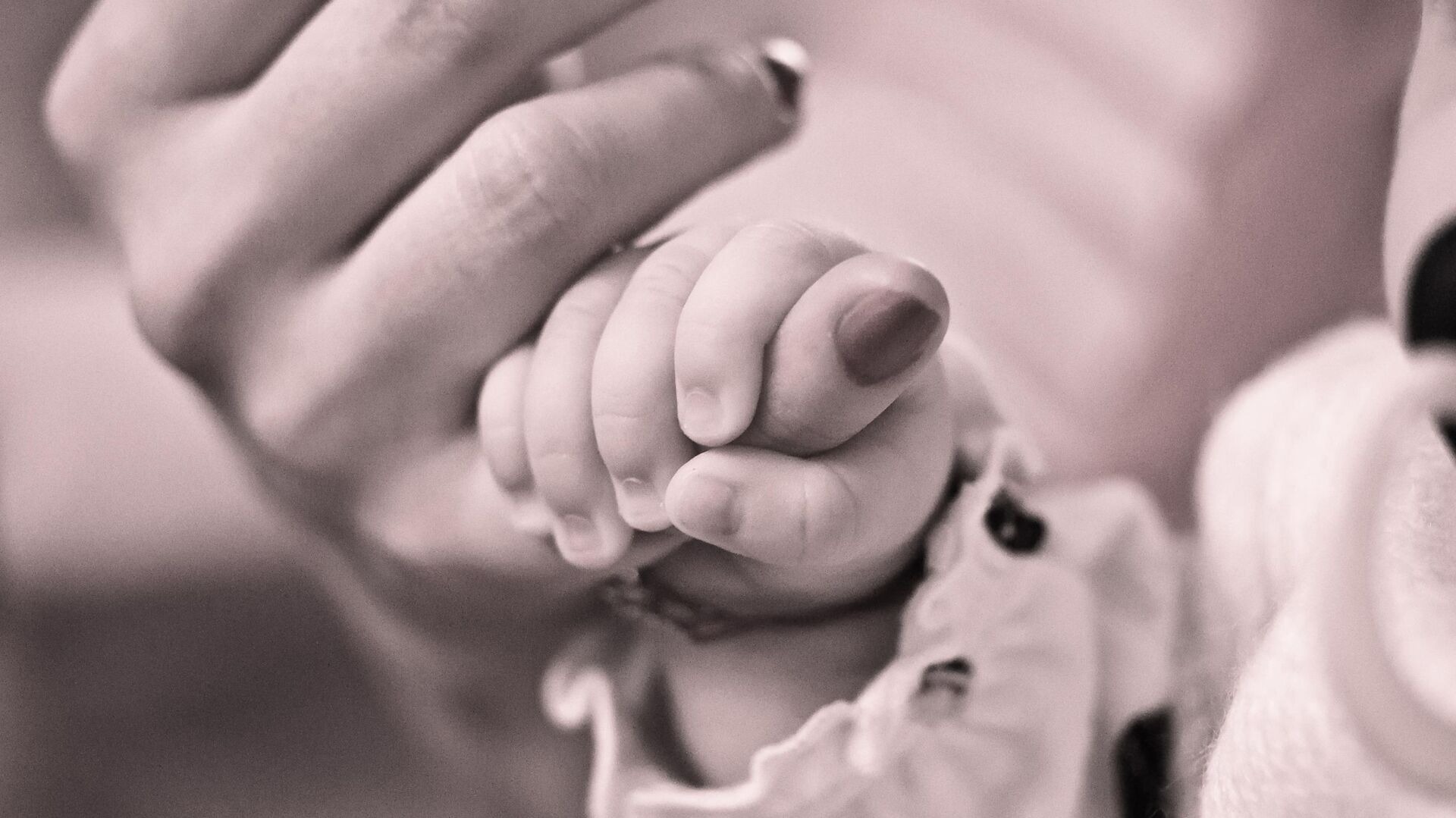https://sputnikglobe.com/20210930/indian-woman-born-without-uterus-fallopian-tubes-makes-her-dream-of-motherhood-come-true-1089540195.html
Indian Woman Born Without Uterus, Fallopian Tubes Makes Her Dream of Motherhood Come True
Indian Woman Born Without Uterus, Fallopian Tubes Makes Her Dream of Motherhood Come True
Sputnik International
The reason for this rare condition, Mayer-Rokitansky-Küster-Hauser (MRKH) syndrome, is still unknown. According to reports, this condition is under-diagnosed... 30.09.2021, Sputnik International
2021-09-30T12:05+0000
2021-09-30T12:05+0000
2021-09-30T12:31+0000
surrogate motherhood
pregnancy
motherhood
healthcare
https://cdn1.img.sputnikglobe.com/img/07e5/04/17/1082705870_0:262:3083:1996_1920x0_80_0_0_a72c6c15be7626928b36ab2f66a1195f.jpg
Twenty-seven-year-old Suparna (name changed) had never dreamt that her visit to a gynaecologist because of painful sex about a year ago would change her life forever. Married for over five years, Suparna, like most women, was hoping to get pregnant and become a mother. However, fate had something else in store for her.After several examinations, the doctors told her that she didn't have a uterus or fallopian tubes. It appeared that she was born without them, as she has Mayer-Rokitansky-Küster-Hauser (MRKH) Syndrome Type 1---a rare congenital disease that shattered her dream of becoming a mother forever. This rare disorder, which occurs in every one in 5,000 women, is generally characterised as an underdeveloped or missing uterus and vagina but normal ovarian function and normal external genitalia. According to the doctors, MRKH is the second most common cause of primary amenorrhea (absence of period) and is largely under-diagnosed due to a lack of awareness. It is commonly identified in early adolescence when girls do not start menstruating. After puberty Suparna was worried when she did not get her periods, and she consulted a doctor. However, the doctor told her that the delay was 'normal' and she would get her periods soon. Dr. Agarwal said during the physical evaluation they found that the secondary sexual characteristics were well-formed for her age. However, during per speculum examination, her vagina was found to be small and ended in a blind pouch. The doctors counselled Suparna and her husband in detail regarding the diagnosis and informed them about the possibility of using a surrogate mother.As per Dr. Agarwal, the couple understood and agreed to it as they were very happy at the prospect of being the biological parents of their child.There are two types of Mayer-Rokitansky-Küster-Hauser (MRKH) Syndrome: In Type 1, the uterus and upper vagina are abnormal, but other organs remain unaffected, and in Type 2 other organs -- commonly the kidneys and the spine -- are also affected. "Symptoms of MRKH Type 1 are mainly reduced vaginal depth and width, and painful sexual intercourse. In addition to these, Type 2 disorder may see a missing kidney or complication or failure of the kidney due to abnormal formation or positioning, abnormalities of the spine, hearing loss, and problems related to the heart and other organs," Dr. Agarwal said. Meanwhile, the doctor stressed that there is "partial" awareness about this condition among the medical fraternity too. "We see most of the people taking things lightly at an early age and have to face consequences. There is a need for awareness about this condition among doctors and especially people." "Even if they have delayed puberty they should undergo tests so that other conditions should be examined at the right time and age if any to prevent severity," she added. Although Suparna was given the option of a uterus transplant, she opted for surrogacy to conceive the children. Last month, she became the mother of two healthy daughters.
https://sputnikglobe.com/20210820/patients-with-rare-diseases-struggle-to-find-cure-and-proper-treatment-in-india-1083637662.html
https://sputnikglobe.com/20210818/india-worst-affected-by-tropical-diseases-listed-as-globally-neglected-by-who-1083637227.html
Sputnik International
feedback@sputniknews.com
+74956456601
MIA „Rossiya Segodnya“
2021
Sushmita Panda
https://cdn1.img.sputnikglobe.com/img/07e5/05/12/1082926186_0:0:2048:2048_100x100_80_0_0_4474d0d7e27a36878eb8727832be74b4.jpg
Sushmita Panda
https://cdn1.img.sputnikglobe.com/img/07e5/05/12/1082926186_0:0:2048:2048_100x100_80_0_0_4474d0d7e27a36878eb8727832be74b4.jpg
News
en_EN
Sputnik International
feedback@sputniknews.com
+74956456601
MIA „Rossiya Segodnya“
Sputnik International
feedback@sputniknews.com
+74956456601
MIA „Rossiya Segodnya“
Sushmita Panda
https://cdn1.img.sputnikglobe.com/img/07e5/05/12/1082926186_0:0:2048:2048_100x100_80_0_0_4474d0d7e27a36878eb8727832be74b4.jpg
surrogate motherhood, pregnancy, motherhood, healthcare
surrogate motherhood, pregnancy, motherhood, healthcare
Indian Woman Born Without Uterus, Fallopian Tubes Makes Her Dream of Motherhood Come True
12:05 GMT 30.09.2021 (Updated: 12:31 GMT 30.09.2021) The reason for this rare condition, Mayer-Rokitansky-Küster-Hauser (MRKH) syndrome, is still unknown. According to reports, this condition is under-diagnosed and this makes it difficult to determine the correct frequency in the general population.
Twenty-seven-year-old Suparna (name changed) had never dreamt that her visit to a gynaecologist because of painful sex about a year ago would change her life forever.
Married for over five years, Suparna, like most women, was hoping to get pregnant and become a
mother. However, fate had something else in store for her.
After several examinations, the doctors told her that she didn't have a uterus or fallopian tubes. It appeared that she was born without them, as she has Mayer-Rokitansky-Küster-Hauser (MRKH) Syndrome Type 1---a rare congenital disease that shattered her dream of becoming a mother forever.

20 August 2021, 10:41 GMT
This rare disorder, which occurs in every one in 5,000 women, is generally characterised as an underdeveloped or missing uterus and vagina but normal ovarian function and normal external genitalia.
According to the doctors, MRKH is the second most common cause of primary amenorrhea (absence of period) and is largely under-diagnosed due to a lack of awareness. It is commonly identified in early adolescence when girls do not start menstruating.
After
puberty Suparna was worried when she did not get her periods, and she consulted a doctor. However, the doctor told her that the delay was 'normal' and she would get her periods soon.
"Women suffering from MRKH Syndrome type 1 mostly have an underdeveloped uterus and/or the vagina (aplasia). In rare cases, there may be narrowing (atresia) of the upper portion of the vagina and an underdeveloped or rudimentary uterus. In some cases, the Fallopian tubes may be affected too though the ovaries are usually unaffected and function normally in women," Dr. Gauri Agarwal, Suparna's doctor and Director and Co-founder of Seeds of Innocence, told Sputnik.
Dr. Agarwal said during the physical evaluation they found that the secondary sexual characteristics were well-formed for her age. However, during per speculum examination, her vagina was found to be small and ended in a blind pouch.
"Though her hormonal evaluation was within normal limits, we could not find uterus during ultrasound examination, though both the ovaries seemed to be normal. For better diagnosis, we conducted an MRI of her abdomen and pelvis, which not only confirmed the absence of uterine fundus and corpus but fallopian tubes as well. Since there were no associated renal or skeletal anomalies, she was diagnosed as a case of MRKH syndrome type 1," Dr. Agarwal said.
The doctors counselled Suparna and her husband in detail regarding the diagnosis and informed them about the possibility of using a surrogate mother.
As per Dr. Agarwal, the couple understood and agreed to it as they were very happy at the prospect of being the biological parents of their child.
There are two types of Mayer-Rokitansky-Küster-Hauser (MRKH) Syndrome: In Type 1, the uterus and upper vagina are abnormal, but other organs remain unaffected, and in Type 2 other organs -- commonly the kidneys and the spine -- are also affected.

18 August 2021, 08:13 GMT
"Symptoms of MRKH Type 1 are mainly reduced vaginal depth and width, and painful sexual intercourse. In addition to these, Type 2 disorder may see a missing kidney or complication or failure of the kidney due to abnormal formation or positioning, abnormalities of the spine, hearing loss, and problems related to the heart and other organs," Dr. Agarwal said.
"My husband, my in-laws, and my own family were all very supportive throughout the diagnosis, planning for surrogacy, and during the surrogacy period. They understood my concerns and anxieties and always helped with rational suggestions and morale-boosting. Since this was diagnosed as a defect since my birth, I do not think anything could have been done better than the option I got now. But yes, I would have got a longer duration to accept the situation," Suparna told Sputnik.
Meanwhile, the doctor stressed that there is "partial" awareness about this condition among the medical fraternity too.
"We see most of the people taking things lightly at an early age and have to face consequences. There is a need for awareness about this condition among doctors and especially people."
"Even if they have delayed puberty they should undergo tests so that other conditions should be examined at the right time and age if any to prevent severity," she added.
Although Suparna was given the option of a uterus transplant, she opted for surrogacy to conceive the children. Last month, she became the mother of two healthy daughters.
"Surreal is the word -- since diagnosis, I never imagined myself holding babies that have my genes but thanks to the surrogate mother and my doctor, it became a reality. I will be forever grateful to them. Most of the women who suffer from similar conditions are very shy in accepting it. I urge them to see a good doctor at the earliest. Knowledge is power. The more you hide, the more delay and harm it causes. Talk to your parents or spouse and see the doctor," she said.




